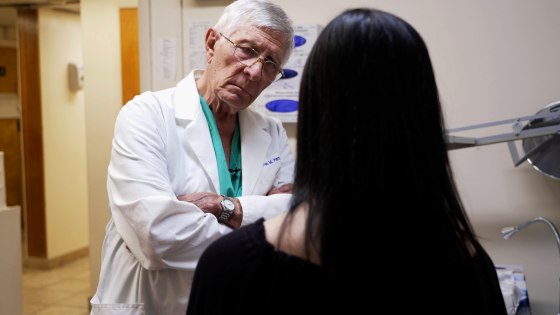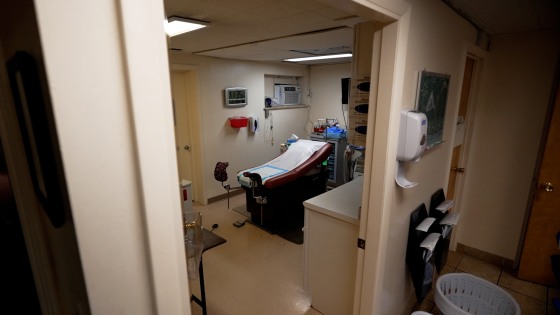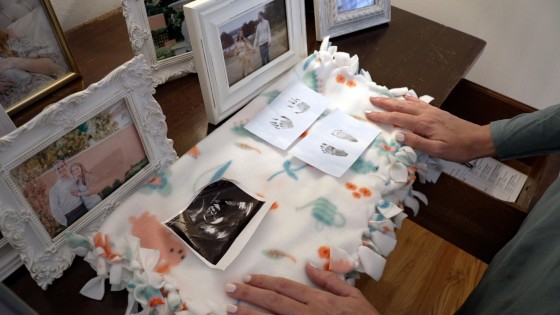News
China Going Back And Forth On Restricting Abortions To Promote Gender Equality
October 1, 2021
September 11, 2024
BOULDER, Colo. — Behind bullet-proof doors in a generic office park is one of only five clinics in the country where women can access the rarest — and most controversial — abortion procedures.
Women come here desperate, says Dr. Warren Hern, who has run the Boulder Abortion Clinic since 1975.
“It ranges from the 12-year-old kid who’s pregnant from her stepfather to the 45-year-old woman who desperately wants to have a baby and finds out that she has a fatal illness that is incompatible with being pregnant,” he says.
Hern and his team specialize in second- and third-trimester abortions, a practice that sparks fierce political debate around an already charged topic.
Dr. Warren Hern speaks with Willow in one of the procedure rooms at the Boulder Abortion Clinic
Those opposed say abortion after the point of fetal viability — about 24 weeks — is simply too late in a pregnancy to terminate. In recent weeks, when asked if he’d vote to lift Florida’s six-week abortion ban in November, former President Donald Trump said he’d vote against it and expressed discomfort with later-term abortions, telling Fox News that “the Democrats are radical because the nine months is just a ridiculous situation, where you can do an abortion in the ninth month.”
During the 2024 presidential debate against President Joe Biden in June, Trump also claimed, “They will take the life of a child in the eighth month, the ninth month and even after birth.”
In reality, only about 1% of abortions are performed after 21 weeks, according to a CDC study. More than 80% occur at or before nine weeks of pregnancy, and just 6% occur from 14 to 20 weeks, which is during the second trimester. Trump did not explain what he meant by “after birth,” since abortion as a procedure involves terminating a pregnancy before birth, and infanticide is illegal in all 50 states.
Hern says he doesn’t perform abortions in the eighth or ninth month at all, and said such a procedure would only occur in an extreme medical emergency and only in a hospital setting.
He says he wishes he didn’t have to do perform abortions beyond the first trimester, but unforeseen circumstances — increasingly from patients coming from red states with strict abortion bans — have created a need for it.
“There’s great distress and anguish,” Hern said, adding that women are increasingly showing up at the clinic when their life or health are in grave danger. The week NBC News visited Hern, his clinic saw 10 patients, all with vastly different circumstances — from a woman who was pregnant with conjoined twins, to a surrogate carrying a fetus that had stopped moving in the womb. 
A procedure room in the Boulder Abortion Clinic, one of only five clinics in the U.S. providing abortion services at or after 28 weeks of pregnancy
Others test the limits of exceptions on abortion bans, like provisions for rape, incest, fatal fetal anomalies and life of the mother, he says.
“We have a patient who is 15 years old, who is 25 weeks pregnant, and was the victim of sexual abuse,” Hern said. Hern then described a fetus at 28 weeks with “terrible malformations of the brain.”
Many of the patients who come to Hern’s clinic are dealing with wanted pregnancies that have gone wrong, like the family that wrote Hern a letter that arrived on his desk in late August: “To the angels at Boulder abortion clinic, there are no words or gifts that can say thank you enough for what you’ve done for our family,” Hern read from the letter. “This was the scariest, hardest thing I have ever experienced, especially with nowhere to go near our home.”
NBC News visited that couple at their home in Texas, where abortion is banned except for limited cases to save the life or health of the woman. Last year, the couple, Emma and Stewart — who wished to go only by their first names to protect their privacy — tried to expand their family and conceived a daughter. But 24 weeks into the pregnancy, they received a diagnosis of a severe fetal anomaly, and possible consequences for Emma’s future fertility.
“We looked at each other and immediately just knew, as husband and wife, that that was the best decision for our family to have an abortion,” Emma said. “And I think it’s just something that you never, ever, ever think that will happen to you, or a decision that you will have to make, and then it just is earth shattering when it falls into your lap.”
“The immediate recommendation was to go out of state,” Stewart said.
They decided to fly to Colorado, one of only nine states that doesn’t set a limit on when a patient can obtain an abortion.
“We had to get on airplane to get out to Colorado, visibly pregnant. There’s strangers coming up to us saying, ‘Congratulations, so great.’ They don’t know what we’re going to do. They don’t know that we’ve just received the worst possible news, and we’re losing a daughter,” he said.

Emma, Stewart and their boys at home in Texas.
After performing Emma’s abortion, Hern’s staff wrapped the fetal remains in a blanket and photographed her for the family. They took her footprints and cremated the body. The framed set of footprints and the baby’s ashes are on display in their home.
“Thank you, Dr Hern, for hugging me after delivery and for photographing our daughter and for your sacrifice and dedication to women’s reproductive rights,” Emma wrote in her letter to Hern. “ Thank you to the staff for providing us a beautiful way to preserve our daughter’s ashes.”
A year later, the couple became parents again to Louie, who they call their miracle baby. But their loss has left a permanent mark.
“My heart and mind have been forever changed about this issue in the worst way,” Emma said. “Abortion is essential health care.”
“I think the second takeaway is to say that abortion bans, exceptions to abortion bans, don’t work in practice. They just don’t,” she said. “The policies to put in place, the exceptions to bans are not working, and they’re putting real families through very traumatic events.”
But not all of Hern’s patients are in Emma’s shoes. Some are pushed too late into unwanted pregnancies due to abortion bans or long wait times at clinics in the post-Roe era.

Emma looks at the footprints and sonogram of the baby she and her husband decided to abort after the diagnosis of a severe fetal anomaly.NBC News
NBC News met a patient in her 20s named Willow at Hern’s clinic. She asked to only use her first name for safety reasons.
Early in her pregnancy, she said, “There were no signs. I didn’t realize that I was pregnant, because my periods are irregular.”
Willow was clear on two things: “I don’t want to be a parent, and I can’t afford it.”
Low on funds, she went to the only place she could get a free pregnancy test and ultrasound — a religious nonprofit crisis pregnancy center. These facilities often advertise free services and support in an effort to dissuade women from seeking abortions.
Willow says the center delayed her care after her positive pregnancy test.
“I had to then wait two weeks to get an ultrasound,” she said.
That ultrasound revealed Willow was five months into her pregnancy.
“I was devastated and terrified,” she said.
Despite being a Colorado resident, Willow still struggled to find a clinic with available appointments that could perform the procedure.
“Two clinics turned me away,” she said. “After the third clinic, they told me no again, because of how far along I was. And they had recommended that I go to this place.” She believes if she had gotten the ultrasound sooner, she might not have been turned away by some of those clinics.
Hern says the Supreme Court’s decision to overturn Roe v. Wade makes situations like Willow’s “more dangerous, more expensive, more difficult and emotionally stressful.”
“The criminalization of abortion in this country is not just a health crisis for women, it’s a national catastrophe for women,” he said.
Since Roe was overturned, 14 states have enacted near-total bans on abortion, according to the Guttmacher Institute, a nonprofit that tracks the data and supports access to abortions.
Hern and other abortion rights advocates say the political climate surrounding abortion is actually making late abortions more common because it’s taking patients longer to get care.
“I mean, one-third of my patients come from Texas, and more than 50% of my patients come from red states where they can get no help,” he said.
No stranger to protesters outside his clinic, Hern often worries that the political climate could also lead to violence.
According to the National Abortion Federation, a professional association of abortion providers, there’s been a rise in harassment and violence against abortion providers in recent years, including arson, burglaries, death threats, and invasions.
Five shots were fired through the clinic’s front windows in 1988. Hern has experienced attempts on his life and his colleagues’ lives, and he had a friend, Dr. George Tiller, who was gunned down by an anti-abortion extremist in the lobby of his church in 2009.
“If I stopped doing abortion, it would never go away. I’m a marked man. That’s the deal,” he says.
Next to every phone in Hern’s office are directions on what to do if a bomb threat is called in. Mugshots of anti-abortion extremists paper the reception area, in case someone tries to attack the clinic. Security is top of mind for Hern and his staff, as well as for the doctors he’s training to take over the clinic when he decides to retire. Hern, after all, is 86 years old.
NBC News spoke to one of those doctors, who asked to remain anonymous while he finishes his residency program in a different state.
“I think that the opposition on the part of folks that don’t want this sort of medical care to be available is not just occasionally violent, but quite explicitly violent,” he said. “The death threats that are received by faculty at my institution are nonstop. The degree of hate directed toward medical doctors that perform this sort of care is very real.”
Despite the threat of violence, the new doctor recalls an anecdote that he says keeps him dedicated to training in the practice of later abortions.
“A woman came in about 25 weeks along,” he says. “The fetal anomaly was not compatible with long-term life after delivery. It was a possibility the baby could be born with a heartbeat, maybe, but there was certainly no guarantee.”
“I remember she begged us in a high-risk maternal medicine clinic, “Don’t let me take him home and watch him die.’ And that really stays with you,” he says. “ I think about her every time, and I think there’s a real sense of, ‘Yes, this work is at times uncomfortable,’ but I’ve never left a patient’s room wondering if we did the right thing. Like the only person that can decide if it was the right thing to do was the patient themselves.”
As abortion remains a top political issue in 2024, Hern, too, vows to keep going.
“It matters for the health of the woman,” he said. “It matters for their families. It matters for our society, and now it matters for freedom.”